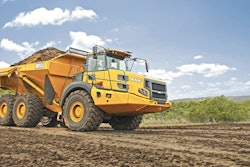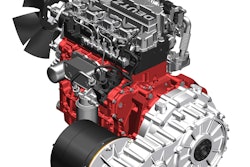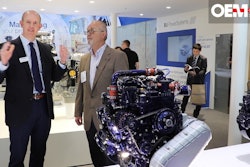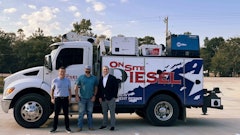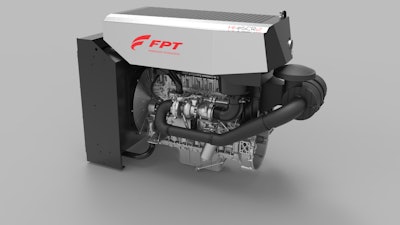
The increasing focus accorded to sustainability has changed and will continue to change the powertrain industry in the coming years. At bauma 2019, the world’s largest construction trade fair, FPT Industrial is setting the pace for the industry with both the consolidation of its Stage V portfolio for the off-road segment and its vision for alternative propulsion.
From April 8-14, visitors at the Messe München, stand A4.115 in Munich, Germany, could learn more about FPT Industrial’s innovative technology and its approach to delivering performance, sustainability and flexibility to meet customers’ needs.
Stage V solutions
Cursor 9 Stage V - Developed for demanding heavy-duty operations, including construction applications, Cursor 9 Stage V was showcased at the fair. With consolidated technical features, such as the high-pressure Common Rail injection, Cursor 9 ensures performance and reliability. 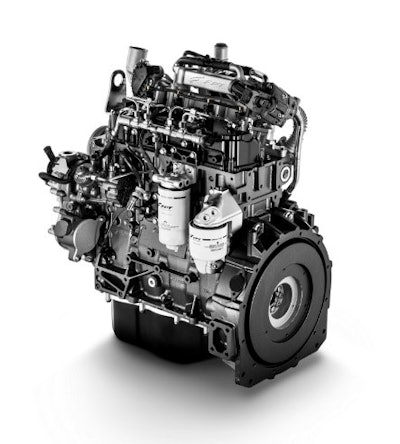 F36 Stage V engine
F36 Stage V engine
To comply with Stage V, this power unit is fitted with the HI-eSCR2 system, the latest generation of FPT Industrial’s after-treatment technology, which allows the engine to achieve uprated standards avoiding Exhaust Gas Recirculation (EGR) and ensuring leadership in fuel economy, power and torque density. It is a maintenance-free technology, granting low operating costs and maximum uptime, together with oil service intervals of 600 hours. The 6-cylinder engine delivers maximum power of 330 kW at 1,800 rpm and maximum torque of 1,800 Nm at 1,500 rpm.
F34 Stage V - Also featured at FPT Industrial’s stand, it is a 3.4 liter, 4-cylinder engine, which delivers maximum power of 55 kW and maximum torque of 424 Nm. For compliance with the most recent emissions standards, it adopts a DOC (Diesel Oxidation Catalyst) + DPF (Diesel Particulate Filter) after-treatment system. With a robust design approach, F34 Stage V is focused on compact equipment, with a responsive engine and high torque output to ensure quick engine response in variable loads conditions. Attributes such as the 600-hour oil change interval and single-side service access reduce operating costs and simplify maintenance operations over the engine entire lifecycle.
 F36 Stage V engine
F36 Stage V engine
PowerPack - All FPT Industrial engines were displayed at bauma in PowerPack configurations, which adds a smart installation solution that encompasses all key aftertreatment components into a single package. PowerPack’s main advantage is its simplicity for installation, since it includes the required components for these purposes, such as DOC, SCR-on-filter, AdBlue injection system, sensors and manifolds.
For increased installation flexibility, the aftertreatment pack can come engine mounted, as a ready-to-use solution, or as a loose pack to allow OEMs to design their own layout. In both cases, all electrical signals and connections are managed by a single cable for fast and reliable linking to the engine and machine electronic management system.
Alternative propulsion
Following the industry evolution, FPT Industrial believes that no single solution fits all markets.
In its strategy to diversify power sources, the brand is enlarging the scope of its electrification division.  FPT's hybrid concept
FPT's hybrid concept
FPT Industrial’s electrification vision is translated into different solutions for different vehicles, according to the machine’s size and energy demand. One of the approaches, showcased at Bauma, is ‘hybrid architecture’, a modular concept which focuses on the support of the thermal combustion engine in all its operational modes. This architecture can improve efficiency and performance while reducing CO2 emissions, and can be applied to a wide range of applications, whether low or high energy demand vehicles, with small or large dimensions and, most importantly, for the off-road, on-road and marine segments.
The thermal engine has two main extra components, the E-Flywheel and the ETurbocharger, which recover energy that can be reused. Compared to a conventional diesel engine, these components guarantee sustainability, performance, efficiency and fuel saving. In fact, FPT Industrial’s hybrid solution can reduce fuel consumption by up to 8%, improve transient response by up to 50%, increase low speed torque, optimize the engine strategy and provide energy availability for auxiliaries and implements.





